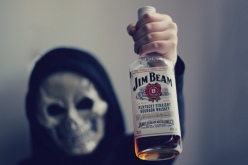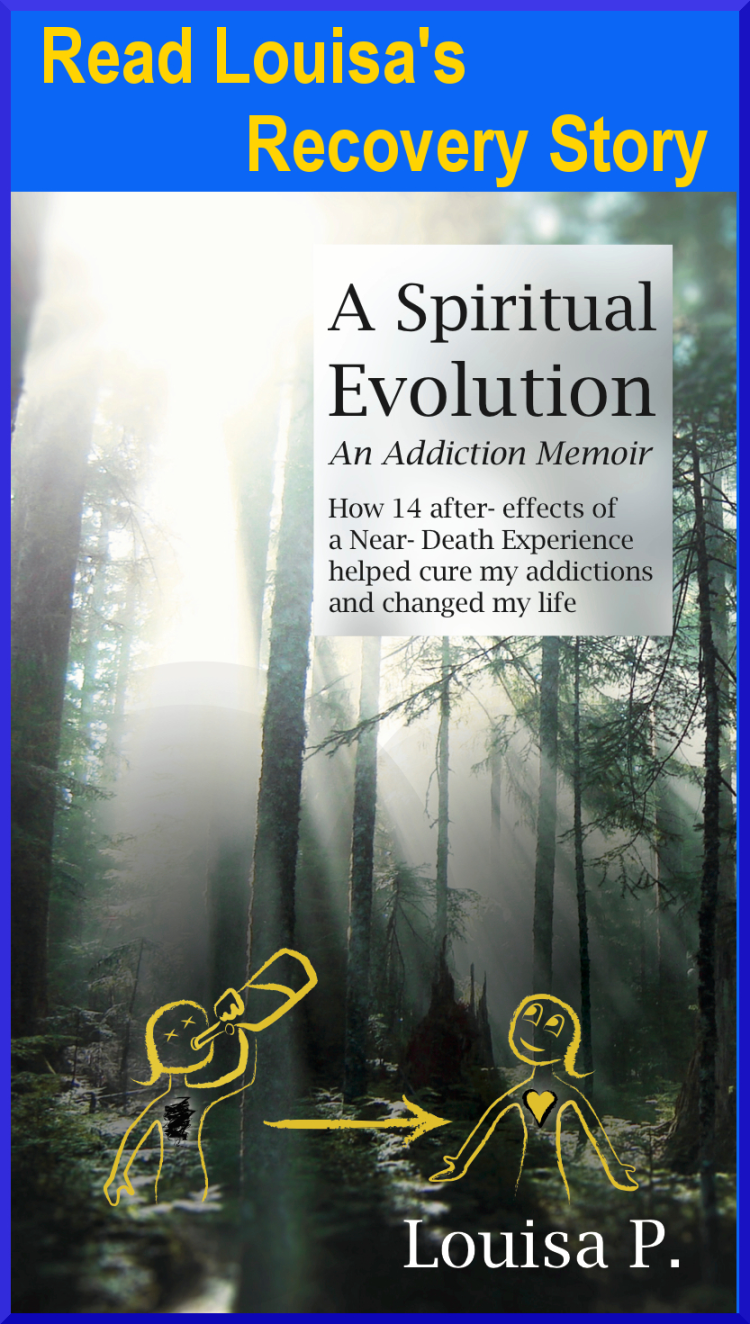…[W]e had but two alternatives: One was to go on to the bitter end, blotting out the consciousness of our intolerable situation as best we could; and the other, to accept spiritual help.–“There is a Solution” (p. 25)
Over the years I’ve grown so accustomed to going to meetings, working the steps, and sponsoring people that I tend to forget I’m actually sober through god’s grace alone. I forget that for most alcoholics, the disease rolls along like a hell-bound runaway train, taking them with it.
The Bitter End: The other day I had coffee with a longtime friend whose ex-husband  – I’ll call him Julius – was once a man vividly alive: handsome, funny, and brilliant. Together they created a beautiful home, the yard landscaped with a Bavarian-style gardenhouse of which I was always a tiny bit jealous. While our children were young, I joined their friends and family at many celebratory gatherings where Julius cheerfully acted as a bartender, mixing everyone’s drinks with a brisk, festive hospitality.
– I’ll call him Julius – was once a man vividly alive: handsome, funny, and brilliant. Together they created a beautiful home, the yard landscaped with a Bavarian-style gardenhouse of which I was always a tiny bit jealous. While our children were young, I joined their friends and family at many celebratory gatherings where Julius cheerfully acted as a bartender, mixing everyone’s drinks with a brisk, festive hospitality.
He didn’t seem to like me much, though. His wife had discussed his suspected ‘drinking problem’ with my partner and me, which he seemed to resent. He was European-born, a year and a half older than I. Alcohol, he maintained, was a normal part of European life – though Americans abused it.
As the years elapsed, however, my friend experienced the many pains of loving an active alcoholic. Finally she found herself cheated on in conjunction with alcohol, much as I would years later. Because Julius scoffed at AA recovery, she’d had to painfully end the relationship and find her happiness elsewhere.
Still, I continued to see Julius regularly because for some time he and I worked at the same place and exercised at the same gym. I’d witness much important foot traffic bustling to and from his windowed office across the hall from my virtual closet. At the gym, he’d stroll into the big cardio room glancing about as if for an audience — tall, blonde, and well aware of his strapping physique. But meeting his eye was only me, that annoying sober woman! We’d exchange nods. Then, about seven years ago, I was laid off and no longer saw him.
So over coffee, I asked my friend, “And how is Julius doing?”
“You didn’t hear?” she started in return. “He died. It was a few months ago.”
I shook my head, speechless.
“His liver went, and then… Didn’t you see his obituary? I put it on Facebook.”
Maybe you know the feeling I had, when you’ve rivaled someone you actually respect. It’s as though the two of you were playing an intent game of ping-pong – and they’re suddenly not there. The ball whizzes off to nowhere, gone forever; you realize that underneath your resentment was… a slightly bruised form of love. True, Julius had seemed to scorn my life choices – to flout sobriety by drinking hard and living well. But he’d also passionately loved his children, the world of intellect, and life itself. At heart, he was a good man.
My friend proceeded to unfold an old, old story lived out by countless alcoholics, a script starring that unsung hero, the liver.  We alcoholics poison ourselves, and our liver cures us. We do it again and again, driven by addiction, and that amazing organ reverses our suicidal onslaughts. Until one day, it can’t. It breaks. But as alcoholics, we can’t stop the onslaught. Poisons course unchecked through our systems, wreaking havoc on other organs – especially the brain.
We alcoholics poison ourselves, and our liver cures us. We do it again and again, driven by addiction, and that amazing organ reverses our suicidal onslaughts. Until one day, it can’t. It breaks. But as alcoholics, we can’t stop the onslaught. Poisons course unchecked through our systems, wreaking havoc on other organs – especially the brain.
Julius could not stop drinking, despite knowing full well alcohol was destroying his life. He became obese and depressed. He lost interest in work and took early retirement. He stopped leaving the house, bathing, shaving, caring about anything. His children both pitied and resented him, because he lived on the couch in a house that smelled bad. He peed himself. He saw no one. Still, he drank. And gradually, as ammonia crippled his brain, he stopped making sense. Visiting to check on him, my friend found him speaking of people not there and tasks imagined. She called 911.
At the hospital, doctors did all they could, but his body could not recoup. A bloated wreck of his former self, watched over by the woman whose love he’d betrayed, with the children he would leave fatherless, 12 and 14, clutching his hands on either side, Julius died.
~
~
Willingness: It’s an odd feeling to hear of someone dying from the same disease you have. There but for the grace of god go I. Nothing could be more true.
I was just like Julius. For so many years, whenever the prospect of my “getting help” was raised by therapists or friends, a bulletproof glass shield came up like an electric car window between me and that idea. “No. That will not happen,” I’d think with an iron will. Like Julius, I planned to slow down and then drink normally. But I’d sooner join a leppers’ nudist colony than mix with those freaks in AA!
How did that change for me – but not him? Surely Julius knew a misery just as dark and painful as mine. But somehow, I was graced with the gift of willingness.
My desire to live jumped tracks. Its impulse switched from “I must drink” to “I must change.” Why that happened for me and not for Julius, I cannot tell you. I did not want to change. I did not believe AA could help me. Yet I made that first call, went to that first meeting in spite of my thinking.
That god provides the defense we lack against the first drink – we’re reminded of that miracle often enough. But even the willingness to BEGIN TO LET GOD HELP US comes from god. A spark of god glows at our core, our source, and yearns to connect outside us. For some, the blockage – our will – is temporarily lifted: our spirit reaches out and god answers. Others languish, locked in self.
Grace is inexplicable! But we can practice gratitude without understanding: “Thank you, god, for my sobriety. Thank you for this life – exactly as it is!”
![]()





Thank you…this is not a unique nor old story for us in recovery……and for me i am always helped by the remember when, those who have lost life to alcohol and those who want to always remember that it is through the Grace of the God of your understanding that we remain the Miracles of following the suggestions of our profound yet simple program…..wishing the best to you and again thank you for eloquent sharing…Brenda, London, Ontario
LikeLiked by 1 person
Thank you, Brenda! Together and with god’s help, we can do this thing called life. Lots of happiness to you up there in London!
LikeLike
Hey Lisa, well written as always 😉
LikeLiked by 1 person
Oops, Louisa of course!
LikeLiked by 1 person
I am so greatful for my life
LikeLike
I’m a 54 y.o. man, and made my first real go in A.A. when I was 31, which lasted 5 years. Since then, only a couple stents of consecutive sober time, one lasting 2.5 years.
I’ve drank most of the last 5 years.
I’ve been around long enough to know how ego and perception can keep us here. But, it’s difficult to return to meetings for me, because that feeling of being judged and myself being so judgmental and guarded seems insurmountable.
LikeLiked by 1 person
Hi Rob –
Thanks for commenting. I’m worried for you. The secret superpower you need now, the power that will open the door for courage and sincerity and everything that can save your life, is humility. Humility is a beautiful letting go. Your pride and self-judgement are TRYING to help you, but they’re walling you off from help and thereby killing you. It’s time to thank and dismiss them.
When my dad died, I could sense that his spirit was going through an intense, remorse-filled life review. He had allowed himself to be fooled again and again and again and again by the assurances of alcoholism. Alcoholism held the football again and again and he Charlie Browned it again and again — and his remorse came from all he’d thrown away through that self-delusion.
The people in your local AA meetings are only human. Some have petty flaws, others have evolved beyond them. But I would guess all want you to heal, hope for you to succeed. They know the helplessness of addiction. When you start regarding others with forgiveness, you’ll find almost magically that you can cease judging yourself, too, and this will open the doors to AA, the 12 steps, and ultimately a relationship with a higher power personal to you.
I send you love and prayers.
LikeLike